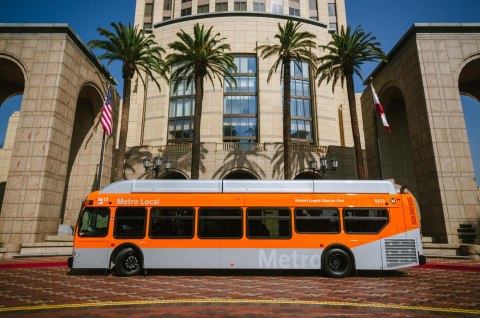Clean Energy Signs Multi-Year Contract with LA Metro for More Than 47 Million Gallons of Renewable Natural Gas
Clean Energy Fuels Corp. (NASDAQ: CLNE) announced that the Los Angeles County Metropolitan Transportation Authority (Metro) has signed a new agreement for an estimated 47.5 million gallons of its renewable natural gas (RNG) to fuel the nation’s largest transit bus fleet.

LA Metro has signed a new agreement for an estimated 47.5 million gallons of Clean Energy's renewable natural gas to fuel the nation’s largest transit bus fleet. (Photo: Business Wire)
This agreement will mark the completion of Metro’s 5-year goal to transition its diesel fleet to cleaner, low-carbon fuel, with 2,400 buses now running on RNG—the first renewable and commercially available vehicle fuel made entirely from organic waste.
“Metro is committed to ensuring a seamless path towards a carbon neutral future,” said Metro’s Chief Sustainability Officer, Cris Liban. “Our use of RNG alongside our ultra-low NOx engines on our existing CNG fleet provides the most cost-effective, equitable, and clean air strategy as we continue to transition to a
The fueling contract resulted from a competitive RFP process, with Metro awarding Clean Energy three fueling depots for a five-year term, with an option to extend up to three additional years. Clean Energy already delivers RNG to five additional Metro fueling depots under a previously awarded RNG agreement.
Over the 5-year period, the transition to RNG will further reduce Metro’s greenhouse gas (GHG) emissions significantly compared to the use of conventional natural gas, driving down Metro’s Scope 1 emissions.
Additionally, Metro has been retrofitting and replacing its buses with the Cummins-Westport Low NOx CNG engines that reduce smog-forming NOx to
Clean Energy’s RNG is derived from capturing the biogenic methane produced by the decomposition of organic waste from dairies, landfills, and wastewater treatment plants. RNG reduces climate-harming greenhouse gas emissions by at least 70 percent, and even up to 300 percent depending on the source of the RNG, making it a negative carbon fuel.
“Metro continues to lead public transportation as one of the cleanest fleets in the US, with nearly 22 million gallons of RNG delivered to Metro since 2017,” said Clean Energy Renewables Senior Vice President, Nate Jensen. “With this additional commitment to fuel with Clean Energy’s RNG, Metro is accelerating its path to net zero carbon emissions through RNG and other alternative fuels.”
About Clean Energy
Clean Energy Fuels Corp. is North America’s leading provider of the cleanest fuel for the transportation market. Through its sales of renewable natural gas (RNG), which is derived from capturing biogenic methane produced from decomposing organic waste, Clean Energy allows thousands of vehicle fleets, from airport shuttles to city buses to waste and heavy-duty trucks, to reduce their amount of climate-harming greenhouse gas by at least
Forward-Looking Statements
This news release contains forward-looking statements within the meaning of Section 27A of the Securities Act of 1933 and Section 21E of the Securities Exchange Act of 1934 that involve risks, uncertainties, and assumptions, including without limitation statements about amounts of RNG expected to be consumed and the benefits of RNG. Actual results and the timing of events could differ materially from those anticipated in these forward-looking statements. The forward-looking statements made herein speak only as of the date of this press release and, unless otherwise required by law, Clean Energy undertakes no obligation to publicly update such forward-looking statements to reflect subsequent events or circumstances. Additionally, the reports and other documents Clean Energy files with the SEC (available at www.sec.gov) contain risk factors, which may cause actual results to differ materially from the forward-looking statements contained in this news release.
View source version on businesswire.com: https://www.businesswire.com/news/home/20210208005062/en/







